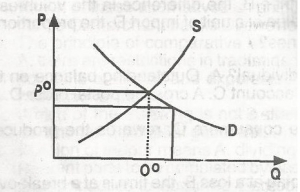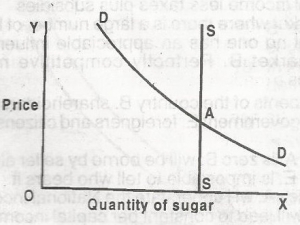Which of the following is a correct definition of equilibrium price?
- A. A price which covers production cost
- B. A price which maximizes entreprenuer's profits
- C. A price at which the quantity demanded equals the quantity supplied
- D. A price at which a competitive firm is at equilibrium
- E. A price which stabilizes farmer's income
If the government is interested in raising the highest revenue from a tax system, then for any two commodities
- A. It is better to tax one whose demand is more elastic
- B. It is better to tax one whose demand is more inelastic
- C. Revenue will be the same from both commodities
- D. It is not possible to say which will yield higher revenue
- E. Government cannot make much revenue from taxing commodities
The terms of trade are said to be favorable only if
- A. Value of total exports equals value of total imports
- B. Value of merchandise exports is greater than value of merchandise imports
- C. There are no balance of payments problems
- D. There is an increase in the value of a unit of export in terms of imports
- E. Foreign exchange reserves do not change
Which is the dominant form of tax in Nigeria
- A. Direct tax
- B. Indirect tax
- C. Inheritance tax
- D. Personal income tax
- E. Value added tax

Commercial banks can create money in the following ways
- A. by issuing coins and paper money
- B. by borrowing money from Banks abroad
- C. by receriving deposits from individuals
- D. by printing money on the instructions of the Central Bank
- E. none of the above

In the above diagram supply and demand conditions of sugar in a Nigerian market are given. An indirect tax of 10 kobo per kg is imposed it will be paid
- A. wholly by the supplier
- B. wholly by the consumer
- C. partly by the supplier and partly by the consumer
- D. wholly by the middlemen
- E. partly by stockholder and partly by consumer
One of the disadvantages of division of labour is that?
- A. there is saving of time
- B. it result in workers acquiring greater skill at their jobs
- C. there is a greater risk of unemployment
- D. it makes possible the use of machinery
- E. it makes the worker less fatigued by his work
The marginal physical product of labour is?
- A. the out put of labour unaided by machinery
- B. the extra revenue from the output of one additional woker
- C. the difference in the output of two workers
- D. additional output achieved when one extraworker is added to fixed account of other factors
- E. none of the above
Which of the following is NOT a determinant of changes in supply?
- A. Changes in the cost of production
- B. Technical progress
- C. Weather
- D. Changes in the number of producers
- E. Changes in the number buyers
Which of the following is NOT a measure for controlling inflation?
- A. Reduction in money supply
- B. Wage restraint and wage freeze
- C. Reduction in taxes and increase in government spending
- D. price control
- E. Credit restriction
Indicate which of the following are invisible trade items in a country’s balance of payments?
- A. oil exports and imports
- B. Gold and foreign reserves
- C. foreign investment
- D. Dividends and profit
- E. Expenditure on the shipping and tourism
In Nigeria, cheques are not money because?
- A. their use is confined to business houses
- B. there are no banks in rular areas
- C. they are not legal tender
- D. they are not generally acceptable as a medium of exchange
- E. most Nigerians cannot identify them
Which of the following is NOT a function of Nigeria commercial Banks?
- A. Acceptance of deposit
- B. Lending of money
- C. Investment in securities and business
- D. Issue of currency
- E. Selling and buying of travellers cheques
In a limited liability company, the greatest risk is borne by?
- A. debenture holders
- B. company executives
- C. ordinary shareholders
- D. preference shareholders
- E. borad of directors
Division of labour is limited by the?
- A. available of raw materials
- B. size of the labour force
- C. size of a labour firm
- D. absolute size of the country's population
- E. per capital income and number of potential buyers
In a normal (typical) demand schedule, the quantity demand is?
- A. directly related to price
- B. inversely related to price
- C. independent of price
- D. proportional related to supply
- E. solely dependent on haggling skill
In a subsistence economy?
- A. there is no shortage of goods and services
- B. the state is the sole owner of resources
- C. production is largely oriented towards consumption in the rular sector
- D. there is no exchange of goods and services
- E. women predominate in all economic activities
Which of the taxes appear generally progressive in nature?
- A. Sales taxes
- B. The personal income tax
- C. Property taxes
- D. Corporation taxes
- E. none of the above
Which of the following is NOT one of the balance of payment entries?
- A. the current account
- B. foreign exchange
- C. Import and Export duties
- D. Short-term capital
- E. Long-term capital
A commercial bank is able to create money
- A. by printing it
- B. by maintaining reserve
- C. by creating a demand deposit as it gives a new loan
- D. by issuing cheques to depositors
- E. by borrowing from the central bank
The value of money depends primarily on?
- A. the gold backing of the currency
- B. the gold backing of both currency and deposit
- C. the general price level
- D. government decree that it is legal tender
- E. none of the above


